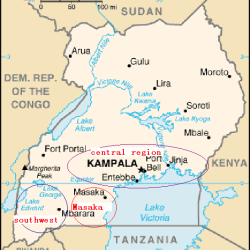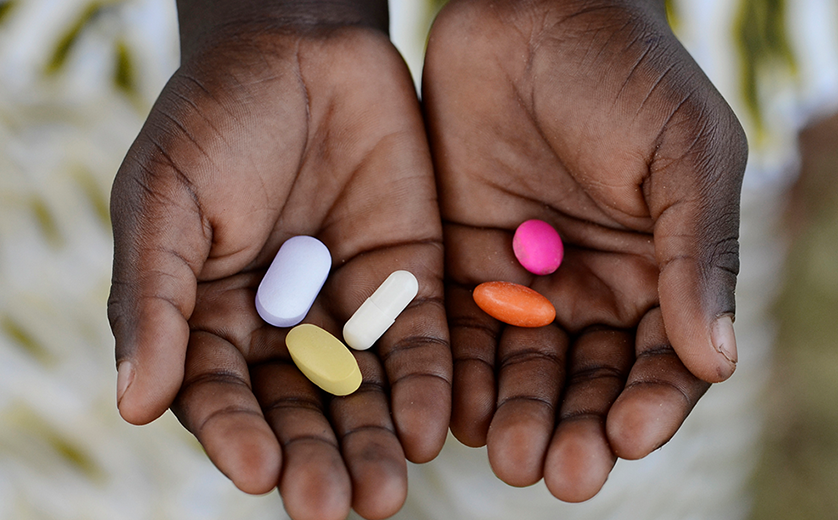In Uganda, a sub-Saharan country that is home to more than 170,000 adolescents living with HIV (known as adolescent HIV for teens), HIV stigma continues to be a significant barrier to HIV treatment adherence among adolescents. This contributes to low rates of medication adherence and viral suppression as well high attrition from HIV treatment services. These issues are even more pronounced for ALHIV in boarding schools.
Researchers Fred Ssewamala, William E. Gordon Distinguished Professor, and Massy Mutumba, assistant professor from the University of Michigan, have teamed up to try to reverse these trends with their new study funded by the National Institute of Mental Health (NIMH). The five-year project is “M-Suubi: A Multi-Level Integrated Intervention to Reduce the Impact Of HIV Stigma on HIV Treatment Outcomes Among Adolescents Living with HIV in Uganda.”
Mutumba met Ssewamala last year while a trainee on the Global LEAD Training Program. LEAD recruits and trains predoctoral students and postdoctoral trainees from diverse backgrounds across the United States, including groups underrepresented in biomedical, behavioral, clinical and social sciences research, interested in global mental health disparities research. That program is co-directed by Ssewamala and Patricia Cavazos-Rehg, a professor in the department of psychiatry at the Washington University School of Medicine.
This new study examines the impact of a multilevel intervention combining group-based HIV stigma reduction. Training for education professionals – educators, school directors, teachers and school nurses – occurs concurrently with multiple family group interventions. The family sessions have a two-fold focus:
- HIV stigma reduction and a family economic empowerment intervention on HIV treatment adherence
- Engagement in care among ALHIV attending boarding schools in Uganda
The study will recruit 840 girls and boys from 42 schools, along with their caregivers. The participants will come from 42 schools located in eight geographical districts heavily affected by HIV. In addition, the study will recruit at least 210 school educators. The intervention will be provided for 20 months, with assessments at baseline, 12-, 24- and 36 months.

“The boarding school social context, a form of institutional care, is very disadvantageous for adolescents living with HIV due to a variety of reasons including: the lack the family support that typically facilitates treatment adherence, lack of privacy, high levels of HIV stigma, and poverty-related food insecurity that results in a lack of food to accompany medication,” said Mutumba.
We hope that by providing evidence based interventions including group and family-based discussions to reduce HIV-associated stigma combined with economic incentives, adolescents will better adhere to their medications.”
This new study will add to Ssewamala’s growing research in this area as director of the International Center for Child Health and Development (ICHAD). “While some of our Center’s previous studies have examined treatment adherence among youth living with HIV, this approach is innovative as there are, to my knowledge, no studies of HIV stigma reduction interventions amongst boarding school populations. M-Suubi will generate knowledge to develop effective treatment strategies to reach ALHIV in these and similar institutional settings,” he noted.
In addition to measuring adherence to medication and HIV stigma, the study will also gather rich data on program implementation and costs. If results are promising, they can quickly and effectively be disseminated to inform practice and policy, and the intervention can be scaled to other boarding schools in the region.
A dynamic team of experts from around the globe will contribute to this study. Co-investigators on the team include:
- Brown School Research Assistant Professors Ozge Sensoy Bahar and Proscovia Nabunya
- Shenyang Guo, Frank J. Bruno Distinguished Professor of Social Work Research
- Yesim Tozan, New York University (cost effectiveness expertise)
- Torsten Neilands, University of California San Francisco (statistical support.)
In Uganda, the team will partner with Abel Mwebembezi from Reach the Youth, Barbara Mukasa from Mildmay Uganda and James Mugisha from Makerere University. For more information about this new study, please visit ICHAD’s M-Suubi website.
